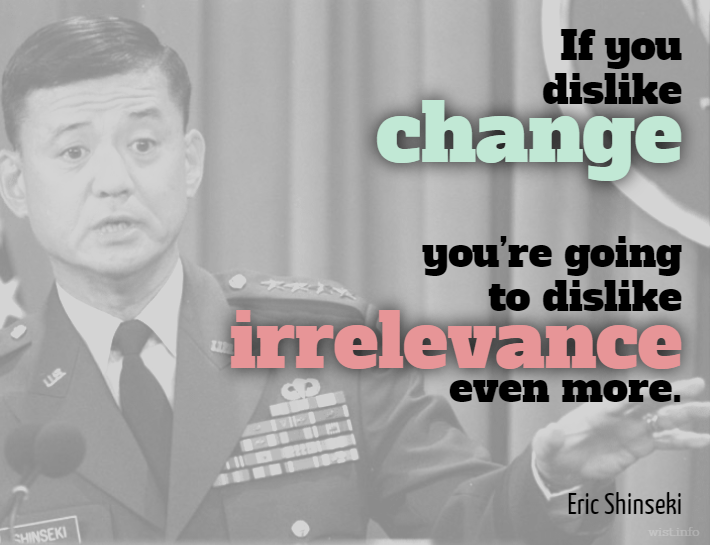The Utopia of a modern dreamer must needs differ in one fundamental aspect from the Nowheres and Utopias men planned before Darwin quickened the thought of the world. Those were all perfect and static States, a balance of happiness won for ever against the forces of unrest and disorder that inhere in things. […] But the Modern Utopia must be not static but kinetic, must shape not as a permanent state but as a hopeful stage, leading to a long ascent of stages. Nowadays we do not resist and overcome the great stream of things, but rather float upon it. We build now not citadels, but ships of state.
H. G. Wells (1866-1946) British writer [Herbert George Wells]
A Modern Utopia, ch. 1, § 1 (1905)
(Source)
Quotations about:
adaptability
Note not all quotations have been tagged, so Search may find additional quotes on this topic.
I know, you always come out on top, the great exception.
Well, someday your enemies will laugh and laugh. Consider:
life is full of changes, and who can stand them better? A man
who treats his body and proud mind to luxury, addicting them,
or someone used to little, and to thinking of the future,
a man wise in peacetime, preparing then the tools of war?[Uni nimirum recte tibi semper erunt res,
o magnus posthac inimicis risus. Uterne
ad casus dubios fidet sibi certius? Hic qui
pluribus adsuerit mentem corpusque superbum,
an qui contentus parvo metuensque futuri
in pace, ut sapiens, aptarit idonea bello?]Horace (65–8 BC) Roman poet, satirist, soldier, politician [Quintus Horatius Flaccus]
Satires [Saturae, Sermones], Book 2, # 2, “Quae virtus et quanta,” l. 106ff (2.2.106-111) (30 BC) [tr. Fuchs (1977)]
(Source)
Reply when a rich person argues with the narrator that they are so wealthy they need not be concerned about wasteful spending. The last line, about a wise man preparing for war during times of peace, is often quoted on its own.
(Source (Latin)). Alternate translations:O ieste, unto thy very foes, for, whether may have more,
(If fortune frowne, and grefes growe on) esperance to his store?
Thou: which was maried to thy mucke, and freshe in gay attyre,
Or he: that dreading chaunce to cum, a litle doth desyre,
And keepes it well, and warylye to helpe in hopelesse tyde:
Lyke as the wyse in golden peace for stormye warre provide.
[tr. Drant (1567)]Cant thou suppose
Thy fate alone will still be prosperous;
Oh, how thine enemies will laugh at thee,
When thou'rt reduc'd to want and beggary!
Which of the two can certainest rely
On his own temper in adversity?
That man whose pamper'd body and his mind,
Have ever been to luxury inclin'd,
Or that's content with little, and doth fear
What may fall out, and wisely does prepare
In time of peace things requisite for war.
[tr. A. F.; ed. Brome (1666)]Kind fortune still, forsooth, shall smile on Thee,
O future sport unto thine Enemy!
And which is better able to endure
Uncertain Chance? And which lives most secure?
He that doth never Fortune's smiles distrust,
But Pampers up himself, and feeds his Lust?
Or He that lives on little now, and spares;
And wisely when 'tis Peace, provides for Wars?
[tr. Creech (1684)]Shalt thou alone no change of fortune know?
Thou future laughter to thy deadliest foe!
But who, with conscious spirit self-secure,
A change of fortune better shall endure?
He, who with such variety of food
Pampers his passions, and inflames his blood,
Or he, contented with his little store,
And wisely cautious of the future hour,
Who in the time of peace with prudent care
Shall for the extremities of war prepare?
[tr. Francis (1747)]Shalt thou alone feel no reverse? Shalt thou
Thrive on for ever as thou thrivest now?
Poor child of scorn! Say which with better grace
May dare to look pert Fortune in the face --
The man that still in luxury's lap reclined
Pampers his body and unnerves his mind --
Or he that, with a little well content
And of his future comforts provident,
Like a wise chief is cautious to prepare
In time of peace the requisites for war?
[tr. Howes (1845)]What, will matters always go well with you alone? 0 thou, that hereafter shalt be the great derision of thine enemies! which of the two shall depend upon himself in exigences with most certainty? He who has used his mind and high-swollen body to redundancies; or he who, contented with a little and provident for the future, like a wise man in time of peace, shall make the necessary preparations for war?
[tr. Smart/Buckley (1853)]No doubt on you alone will fortune never cease to smile! O you doomed soon to be great source of laughter to your enemies when all your wealth is spent! Now which of these two characters will have a surer self-reliance 'gainst reverse? The one who has long used his haughty mind and pampered frame to luxury, or he who, satisfied with humble life, and careful of his future lot, like a good general has well prepared for war in time of peace.
[tr. Millington (1870)]Ay, you're the man: the world will go your way ...
O how your foes will laugh at you one day!
Take measure of the future: which will feel
More confidence in self, come woe, come weal,
He that, like you, by long indulgence plants
In body and in mind a thousand wants,
Or he who, wise and frugal, lays in stores
In view of war ere war is at the doors?
[tr. Conington (1874)]You alone, of course, will always find things go well. Oh, what a laughing-stock you will be some day for your enemies! Which of the two, in face of changes and chances, will have more self-confidence -- he who has accustomed a pampered mind and body to superfluities, or he who, content with little and fearful of the future, has in peace, like a wise man, provided for the needs of war?
[tr. Fairclough (Loeb) (1926)]For you alone, things will always go well: how interesting!
Later on, your foes will get a big laugh out of you.
Of the following two, which one has the better chance
Of remaining self-assured in vicissitude:
The man who has accustomed his mind and magnificent body
To all the luxuries or the man who, content with little,
Fearing the future, provides in time of peace,
As a wise man should, the equipment required for war?
[tr. Palmer Bovie (1959)]Undoubtedly you believe that for you,
only for you, things will always go well.
And then arrives the day when your enemies
will have the last laugh. In the changeable
events of life, who can count on himself
with greater security? -- he who has
proudly habituated both his body
and his soul to superfluous luxuries,
or he who, content with little, and fearful
of the future, has the wisdom to prepare
himself in peacetime for that which serves in war?
[tr. Alexander (1999)]Fate won't snicker at you
ever, you must think; what good fun you'll provide
your enemies one of these days. Who will
fare better when his luck changes, one who
coddles mind and body with all comforts,
or one who can get by on little and
prepares for change, the way a wise man
keeps his weapons oiled and sharp in peacetime?
[tr. Matthews (2002)]For you alone, I suppose, nothing will ever go wrong.
What a whale of a laugh you'll give your enemies! In times of crisis
which of the two will have greater confidence -- the man who has led
his mind and body to expect affluence as of right,
or the man with few needs who is apprehensive of the future
and who in peacetime has wisely made preparations for war?
[tr. Rudd (2005 ed.)]You alone, is it, trouble won’t touch!
O how your enemies will laugh some day! In times
Of uncertainty who’s more confident? The man
Who’s accustomed a fastidious mind and body
To excess, or the man content with little, wary
Of what’s to come, who wisely in peace prepared for war?
[tr. Kline (2015)]
For the happiest life, rigorously plan your days, leave your nights open to chance.
Mignon McLaughlin (1913-1983) American journalist and author
The Second Neurotic’s Notebook, ch. 4 (1966)
(Source)
Variant: "For the happiest life, days should be rigorously planned, nights left open to chance."
Always remember: If you’re alone in the kitchen and you drop the lamb, you can always just pick it up. Who’s going to know?
Julia Child (1912-2004) American chef and writer
“What I’ve Learned: Julia Child,” interview by Mike Sager, Esquire (2001-06)
(Source)
Reprinted in Brendan Vaughan, Esquire: The Meaning of Life (2004).
This quotation, and variations on it, are (in)famous regarding Child. The earliest version can be found in her public TV show, The French Chef, 1x22 "The Potato Show" (1963-06-29). In that filmed-live episode, a potato pancake flip ends poorly, spilling onto other parts of the range. Child scoops up the spilled bits and puts them back into the pan:Well, that didn't go very well. See, when I flipped it I didn't have the courage to do it the way I should have. But you can always pick it up, and if you are alone in the kitchen, who is going to see?
In an era before online video, and on such an initially obscure show, variations appeared almost immediately, e.g., in Blake Hunter, "A Tasty Dish," "Educational TV" column, Film News (1964-10), which gave the quote as happening when a potato pancake spilled on a sideboard:If this happens, just scoop it back into the pan. Remember, you are alone in the kitchen, and nobody can see you.
The story grew in the telling, and eventually was told as her dropping a chicken. Many folk incorrectly recall this as being one of the gags in the (hilarious) 1978 Saturday Night Live skit starring Dan Aykroyd as Child.
Child often pointed to the incident as involving a potato pancake, not a chicken, though as noted, her lamb comment still stands as another hypothetical.
Civilization is to groups what intelligence is to individuals. It is a means of combining the intelligence of many to achieve ongoing group adaptation.
It is loyalty to great ends, even though forced to combine the small and opposing motives of selfish men to accomplish them; it is the anchored cling to solid principles of duty and action, which knows how to swing with the tide, but is never carried away by it — that we demand in public men, and not sameness of policy, or a conscientious persistency in what is impracticable.
If Afflictions refine some, they consume others.
Thomas Fuller (1654-1734) English physician, preacher, aphorist, writer
Gnomologia: Adages and Proverbs (compiler), # 2666 (1732)
(Source)
Richard was not dead. He was sitting in the dark, on a ledge, on the side of a storm drain, wondering what to do, wondering how much further out of his league he could possibly get. His life so far, he decided, had prepared him perfectly for a job in Securities, for shopping at the supermarket, for watching soccer on the television on the weekends, for turning up the thermostat if he got cold. It had magnificently failed to prepare him for a life as an un-person on the roofs and in the sewers of London, for a life in the cold and the wet and the dark.
Neil Gaiman (b. 1960) British author, screenwriter, fabulist
Neverwhere, ch. 4 (1996)
(Source)
The above is the original US edition language. The 2006 "Author's Preferred Text" edition restores (even in the US) a few British turns of phrase that were in the original British edition (which I am fortunate enough to own).Richard was not dead. He was sitting in the dark, on a ledge, on the side of a storm drain, wondering what to do, wondering how much further out of his depth he could possibly get. His life so far, he decided, had prepared him perfectly for a job in Securities, for shopping at the supermarket, for watching football on the telly on the weekends, for turning on a heater if he got cold. It had magnificently failed to prepare him for a life as an un-person on the roofs and in the sewers of London, for a life in the cold and the wet and the dark.
There must be either a predestined Necessity and inviolable plan, or a gracious Providence, or a chaos without design or director. If then there be an inevitable Necessity, why kick against the pricks? If a Providence that is ready to be gracious, render thyself worthy of divine succour. But if a chaos without guide, congratulate thyself that amid such a surging sea thou hast a guiding Reason.
[Ἤτοι ἀνάγκη εἱμαρμένης καὶ ἀπαράβατος τάξις ἢ πρόνοια ἱλάσιμος ἢ φυρμὸς εἰκαιότητος ἀπροστάτητος. εἰ μὲν οὖν ἀπαράβατος ἀνάγκη, τί ἀντιτείνεις; εἰ δὲ πρόνοια ἐπιδεχομένη τὸ ἱλάσκεσθαι, ἄξιον σαυτὸν ποίησον τῆς ἐκ τοῦ θείου βοηθείας. εἰ δὲ φυρμὸς ἀνηγεμόνευτος, ἀσμένιζε ὅτι ἐν τοιούτῳ κλύδωνι αὐτὸς ἔχεις ἐν σαυτῷ τινα νοῦν ἡγεμονικόν.]
Marcus Aurelius (AD 121-180) Roman emperor (161-180), Stoic philosopher
Meditations, Book 12, #14 [tr. Haines (1916)]
(Source)
Original Greek. Alternate translations:Either fate, (and that either an absolute necessity, and unavoidable decree; or a placable and flexible Providence) or all is a mere casual confusion, void of all order and government. If an absolute and unavoidable necessity, why doest thou resist? If a placable and exorable Providence, make thyself worthy of the divine help and assistance. If all be a mere confusion without any moderator, or governor, then hast thou reason to congratulate thyself; that in such a general flood of confusion thou thyself hast obtained a reasonable faculty, whereby thou mayest govern thine own life and actions.
[tr. Casaubon (1634), #11]Either the Order of Things are fixed by irrevocable Fate, or Providence may be worked into Compassion, or else the World Floats at Raondom without any Steerage. Now if nature lies under immovable Necessity, to what purpose should you struggle against it? If the favor of Providence is to be gained, qualify your self for the Divine Assistance: But if Chance, and Confusion carry it, and no body sits at the Helm; be you contented and Ride out the Storm patiently, for you have a Governor within you , though the World has none.
[tr. Collier (1701)]Either there is a fatal necessity and invincible order, or a kind providence, or a confusion without a purpose and without a director. If then there is an invincible necessity, why dost thou resist? But if there is a providence which allows itself to be propitiated, make thyself worthy of the help of the divinity. But if there is a confusion without a governor, be content that in such a tempest thou hast in thyself a certain ruling intelligence.
[tr. Long (1862)]Either the order of things is fixed by irrevocable fate, or providence may be worked into compassion, or else the world floats at random without any steerage. Now if nature lies under an immovable necessity, to what purpose should you struggle against it? If the favor of providence is to be gained, qualify yourself for divine assistance; but if chance and confusion prevail, be you contented that in such a storm you have a governing intelligence within you.
[tr. Zimmern (1887)]Either the Necessity of destiny and an order none may transgress, or Providence that hears intercession, or an ungoverned welter without a purpose. If then a Necessity which none may transgress, why do you resist? If a Providence admitting intercession, make yourself worthy of assistance from the Godhead. If an undirected welter, be glad that in so great a flood of waves you have yourself within you a directing mind.
[tr. Farquharson (1944)]Fatal necessity, and inescapable order. Or benevolent Providence. Or confusion -- random and undirected. If it's an inescapable necessity, why resist it? If it's Providence, admits of being worshipped, then try to be worthy of God's aid. If it's confusion and anarchy, then be grateful that on this raging sea you have a mind to guide you.
[tr. Hays (2003)]Either predetermined necessity and unalterable cosmic order, or a gracious providence, or a chaotic ungoverned mixture. If a predetermined necessity, why do you resist? If it is a gracious Providence that can hear our prayers, then make yourself worthy of divine assistance. If a chaotic ungoverned mixture, be satisfied that in the midst of this storm, you have within yourself a mind whose nature it is to govern and command.
[tr. Needleman/Piazza (2008)]
It is a good Blade that bends well.
Thomas Fuller (1654-1734) English physician, preacher, aphorist, writer
Gnomologia: Adages and Proverbs (compiler), # 2853 (1732)
(Source)
The longer I live, the more I am satisfied of two things: first, that the truest lives are those that are cut rose-diamond-fashion, with many facets answering to the many-planed aspects of the world about them; secondly, that society is always trying in some way or other to grind us down to a single flat surface.
Poetry demands a man with special gift for it, or else one with a touch of madness in him; the former can easily assume the required mood, and the latter may be actually beside himself with emotion.
[διὸ εὐφυοῦς ἡ ποιητική ἐστιν ἢ μανικοῦ: τούτων γὰρ οἱ μὲν εὔπλαστοι οἱ δὲ ἐκστατικοί εἰσιν.]
Aristotle (384-322 BC) Greek philosopher
Poetics [Περὶ ποιητικῆς, De Poetica], ch. 17 / 1455a.33 (c. 335 BC) [tr. Bywater (1909)]
(Source)
Original Greek. Fyfe (below) notes μανικός to mean "genius to madness near allied," and adds "Plato held that the only excuse for a poet was that he couldn't help it." A possible source of Seneca's "touch of madness" attribution to Aristotle. Alternate translations:Poetry implies either a happy gift of nature or a strain of madness. In the one case a man can take the mould of any character; in the other, he is lifted out of his proper self.
[tr. Butcher (1895)]Poetry is the work for the finely constituted or the hysterical; for the hysterical are impressionable, whereas the finely constituted are liable to outbursts.
[tr. Margoliouth (1911); whiles this seems backward, Margoliouth further explains in his footnote.]Poetry needs either a sympathetic nature or a madman, the former being impressionable and the latter inspired.
[tr. Fyfe (1932)]Hence the poetic art belongs either to a naturally gifted person or an insane one, since those of the former sort are easily adaptable and the latter are out of their senses.
[tr. Sachs (2006)]In order to write tragic poetry, you must be either a genius who can adapt himself to anything, or a madman who lets himself get carried away.
[tr. Kenny (2013)]
I tell this story to illustrate the truth of the statement I heard long ago in the Army: Plans are worthless, but planning is everything.
Dwight David Eisenhower (1890-1969) American general, US President (1953-61)
Speech, National Defense Executive Reserve Conference (14 Nov 1957)
Quoted in R. Nixon, Six Crises, "Krushchev" (1962) as "In preparing for battle I have always found that plans are useless, but planning is indispensable." Sometimes paraphrased as "Plans are nothing; planning is everything."
To be interested in the changing seasons is, in this middling zone, a happier state of mind than to be hopelessly in love with spring.
George Santayana (1863-1952) Spanish-American poet and philosopher [Jorge Agustín Nicolás Ruíz de Santayana y Borrás]
The Life of Reason or The Phases of Human Progress, Vol. 4 “Reason in Art,” ch. 9 “Justification of Art” (1905-06)
Full text.
This imputation of inconsistency is one to which every sound politician and every honest thinker must sooner or later subject himself. The foolish and the dead alone never change their opinions.
James Russell Lowell (1819-1891) American diplomat, essayist, poet
“Abraham Lincoln” (1864), My Study Windows (1871)
(Source)

















